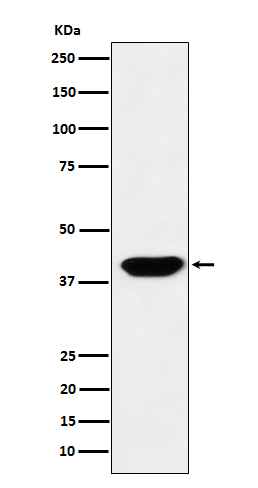Anti-Islet1 Monoclonal Antibody
- SPECIFICATION
- CITATIONS
- PROTOCOLS
- BACKGROUND

Application
| WB, IHC, IF, ICC, IP, FC |
|---|---|
| Primary Accession | P61371 |
| Host | Rabbit |
| Isotype | Rabbit IgG |
| Reactivity | Human |
| Clonality | Monoclonal |
| Format | Liquid |
| Description | Anti-Islet1 Monoclonal Antibody . Tested in WB, IHC, ICC/IF, IP, Flow Cytometry applications. This antibody reacts with Human. |
| Gene ID | 3670 |
|---|---|
| Other Names | Insulin gene enhancer protein ISL-1, Islet-1, ISL1 |
| Calculated MW | 39036 Da |
| Application Details | WB 1:500-1:2000 IHC 1:50-1:200 ICC/IF 1:50-1:200 IP 1:50 FC 1:50 |
| Contents | Rabbit IgG in phosphate buffered saline, pH 7.4, 150mM NaCl, 0.02% sodium azide and 50% glycerol, 0.4-0.5mg/ml BSA. |
| Clone Names | Clone: AFIA-9 |
| Immunogen | A synthesized peptide derived from human Islet1 ISL1 (ISL1 transcription factor, LIM/homeodomain) is a member of the LIM/homeodomain family of transcription factors. It binds to the enhancer region of the insulin gene, among others, and may play an important role in regulating insulin gene expression. It is central to the development of pancreatic cell lineages and may also be required for motor neuron generation. Islet-1 expression defines cardiac progenitor cell populations and is required for normal cardiac development and asymmetry. |
| Purification | Affinity-chromatography |
| Storage | Store at -20°C for one year. For short term storage and frequent use, store at 4°C for up to one month. Avoid repeated freeze-thaw cycles. |
| Name | ISL1 |
|---|---|
| Function | DNA-binding transcriptional activator. Recognizes and binds to the consensus octamer binding site 5'-ATAATTAA-3' in promoter of target genes. Plays a fundamental role in the gene regulatory network essential for retinal ganglion cell (RGC) differentiation. Cooperates with the transcription factor POU4F2 to achieve maximal levels of expression of RGC target genes and RGC fate specification in the developing retina. Involved in the specification of motor neurons in cooperation with LHX3 and LDB1 (By similarity). Binds to insulin gene enhancer sequences (By similarity). Essential for heart development. Marker of one progenitor cell population that give rise to the outflow tract, right ventricle, a subset of left ventricular cells, and a large number of atrial cells as well, its function is required for these progenitors to contribute to the heart. Controls the expression of FGF and BMP growth factors in this cell population and is required for proliferation and survival of cells within pharyngeal foregut endoderm and adjacent splanchnic mesoderm as well as for migration of cardiac progenitors into the heart (By similarity). |
| Cellular Location | Nucleus {ECO:0000250|UniProtKB:P61372}. |
| Tissue Location | Expressed in subsets of neurons of the adrenal medulla and dorsal root ganglion, inner nuclear and ganglion cell layers in the retina, the pineal and some regions of the brain |
Research Areas
Citations (0)

Thousands of laboratories across the world have published research that depended on the performance of antibodies from Abcepta to advance their research. Check out links to articles that cite our products in major peer-reviewed journals, organized by research category.
Submit your citation using an Abcepta antibody to
info@abcepta.com, and receive a free "I Love Antibodies" mug.
info@abcepta.com, and receive a free "I Love Antibodies" mug.
Application Protocols
Provided below are standard protocols that you may find useful for product applications.
Abcepta welcomes feedback from its customers.
If you have used an Abcepta product and would like to share how it has performed, please click on the "Submit Review" button and provide the requested information. Our staff will examine and post your review and contact you if needed.
If you have any additional inquiries please email technical services at tech@abcepta.com.
$ 370.00
Cat# ABO14777
Ordering Information
United States
AlbaniaAustraliaAustriaBelgiumBosnia & HerzegovinaBrazilBulgariaCanadaCentral AmericaChinaCroatiaCyprusCzech RepublicDenmarkEstoniaFinlandFranceGermanyGreeceHong KongHungaryIcelandIndiaIndonesiaIrelandIsraelItalyJapanLatviaLithuaniaLuxembourgMacedoniaMalaysiaMaltaMexicoNetherlandsNew ZealandNorwayPakistanPolandPortugalRomaniaSerbiaSingaporeSlovakiaSloveniaSouth AfricaSouth KoreaSpainSwedenSwitzerlandTaiwanTurkeyUnited KingdomUnited StatesVietnamWorldwideOthers
USA Headquarters
(888) 735-7227 / (858) 622-0099 or (858) 875-1900
Other Products
Shipping Information
Domestic orders (in stock items)
Shipped out the same day. Orders placed after 1 PM (PST) will ship out the next business day.
International orders
Contact your local distributors




